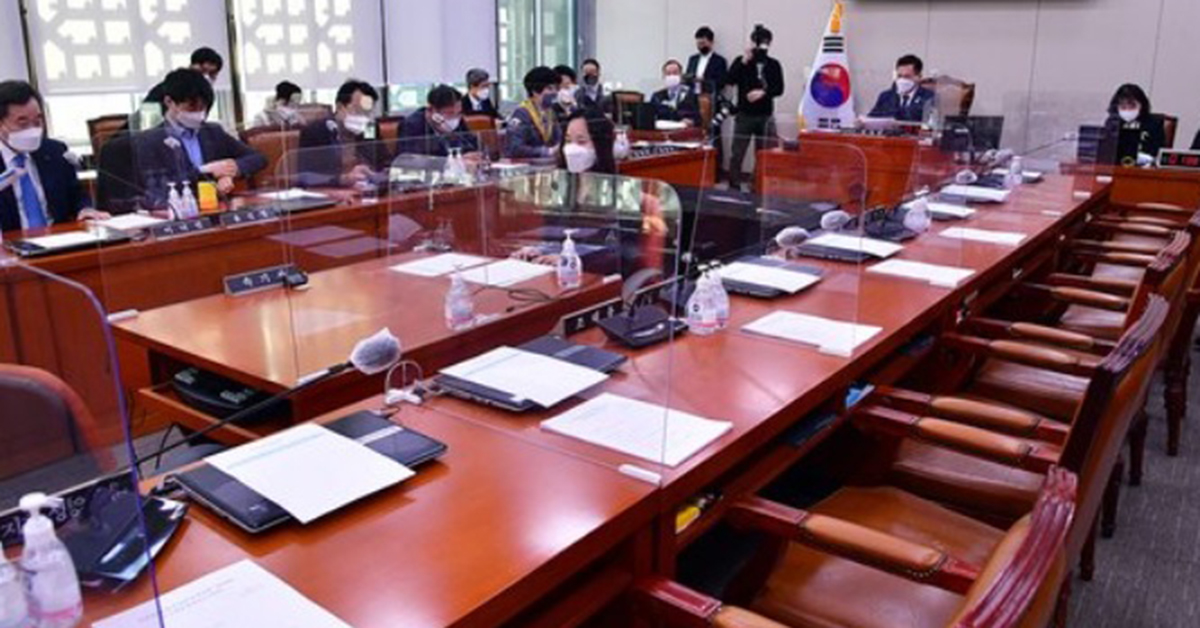President Moon Jae-in appointed Foreign Minister Eui-yong Eui-yong on the 8th, and as of the 9th, 28 ministerial-level personnel were appointed without the consent of the opposition party.

Chairman Song Young-gil is adopting the progress report of the personnel hearing of the Minister of Foreign Affairs Jeong Eui-yong, with members of the People’s Power leaving at the general meeting of the Foreign Affairs and Transportation Day Committee held at the National Assembly in Yeouido, Seoul on the morning of the 8th. News 1
At each hearing, the opposition party went out with a vote to adopt the hearing report. The ruling party protests against the outgoing opposition lawmakers, saying, ‘catching ankle’, and adopts the report by standing or applauding. And President Moon appoints the minister by sarcasm of the hearing system itself, saying, “There is a legendary story that you must suffer at hearings to do your job well.”
It is the pattern of the Moon Jae-in government’s appointment of ministers, which has been repeated so far, and is the’official’ of hearings.
There are 28 ministers appointed in this way. Although he has left his term of office for one year and three months, it has already exceeded the total number of personnel appointed during the Lee Myung-bak administration (10) and the Park Geun-hye administration (17). And the record is likely to keep breaking.
However, President Moon’s appointment method has changed since the 21st general election last year.
This is because the ruling party occupied the majority. Since the ruling party alone was unable to adopt a hearing report, the president was forced to appoint without a hearing report. For this, additional procedures such as a request for resending the report were necessary. However, when the ruling party took over 18 standing chairpersons in the 21st general election, even the retransmission procedure became unnecessary. This is because the ruling party alone can adopt the report.
In addition to Minister Eui-yong Eui-yong, Minister of Unification Lee In-young, Ministry of Land, Infrastructure and Transport, Byun Chang-heum, Justice Minister Park Beom-gye, and National Intelligence Service Chief Park Ji-won were appointed through these procedures.
A key official of the people’s power said to the JoongAng Ilbo, “I’m going to appoint it anyway, but I don’t know why the hearing is being held.”
In fact, a diplomatic source familiar with the process of preparing for the hearing of Minister Eui-yong Jung said in the JoongAng Ilbo, “In many cases, government officials were hung up without holidays to prepare answers to questions from 800 lawmakers a day.” There is a hearing, but President Mana is pushing for the appointment, so should we continue this type of hearing?”
In politics, the root cause of’hearing dance theory’ is related to the president’s perception of hearing.
President Moon said in a conversation with National Assembly Speaker Park Byeong-seok, etc., before the National Assembly’s municipal speech on October 28, last year, saying, “It is really not easy to have good talent.” “There is actually a phenomenon of avoiding hearings. Even if I have a will, there are cases where I could not have good people because my family opposed it.” He said, “Wouldn’t the hearing be a process of verifying the person (not the family) as much as possible?” President Moon basically recognizes the hearing as a place of political offensive and stunting of the opposition party.
In some cases, complaints against the opposition party were directly addressed at the ministerial appointment ceremony. Remarks such as “The process of the personnel hearing was a scratching ceremony” (Chairman of the Fair Trade Commission Kim Sang-jo in 2017) or “The stronger the reformation is, the more difficult it is” (Minister of Justice Cho Kuk in 2019). He also emphasized that there were no procedural defects, saying, “The constitution does not require the consent of the National Assembly and the president has the right to appoint.”

Members of the Liberal Korean Party (now the power of the people) are holding a condemnation contest against the approval of a motion for the appointment of Prime Minister Jeong Sye-gyun. At that time, the opposition party participated in the voting for the nomination motion, but afterwards, they left and did not participate in the law to adjust the prosecutors’ investigation right and the 3rd Kindergarten Act. yunhap news
On the other hand, there is also a view of the opposition party’s excessive political offensive.
Professor Kim Yong-cheol of Pusan National University told JoongAng Ilbo, “The attitude of the passport ignoring the hearing procedure is a fundamental problem, but there is a side that the opposition party with fewer seats is using the hearing as a means of political offensive to inform its presence. Rejection can also be viewed as a political act, but the appearance of boycotting all agendas is not desirable in terms of the procedural legitimacy of democracy.”
Reporter Kang Tae-hwa [email protected]
